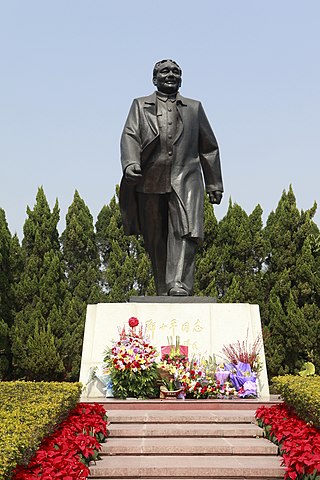| |||||
| Decades: | |||||
|---|---|---|---|---|---|
| See also: | Other events of 1980 History of China • Timeline • Years | ||||
The following lists events in the year 1980 in China .
| |||||
| Decades: | |||||
|---|---|---|---|---|---|
| See also: | Other events of 1980 History of China • Timeline • Years | ||||
The following lists events in the year 1980 in China .

Hua Guofeng was a Chinese politician who served as chairman of the Chinese Communist Party and the 2nd premier of China. The designated successor of Mao Zedong, Hua held the top offices of the government, party, and the military after the deaths of Mao and Premier Zhou Enlai, but was gradually forced out of supreme power by a coalition of party leaders between December 1978 and June 1981, and subsequently retreated from the political limelight, though still remaining a member of the Central Committee until 2002.

The Politburo Standing Committee (PSC), officially the Standing Committee of the Political Bureau of the Central Committee of the Communist Party of China, is a committee consisting of the top leadership of the Chinese Communist Party (CCP). Historically it has been composed of five to eleven members, and currently has seven members. Its officially mandated purpose is to conduct policy discussions and make decisions on major issues when the Politburo, a larger decision-making body, is not in session. According to the party's constitution, the General Secretary of the Central Committee must also be a member of the Politburo Standing Committee.

Chen Yun was a Chinese revolutionary leader who was one of the most influential leaders of the People's Republic of China during the 1980s and 1990s and one of the major architects and important policy makers for the reform and opening up period, alongside Deng Xiaoping. He was also known as Liao Chenyun (廖陈云), as he took his uncle's family name when he was adopted by him after his parents died.
Generations of Chinese leadership is a term historians use to characterize distinct periods of the leadership of the Chinese Communist Party (CCP) and, by extension, successive changes in the ideology of the CCP. Historians have studied various periods in the development of the government of the People's Republic of China (PRC) by reference to these "generations".

Li Xiannian was a Chinese Communist military and political leader, president of China from 1983 to 1988 under paramount leader Deng Xiaoping and then chairman of the Chinese People's Political Consultative Conference from 1988 until his death. He was a full member of the Politburo from 1956 to 1987, and of its Standing Committee from 1977 to 1987.
Events from the year 1971 in China.
The 12th Central Committee of the Chinese Communist Party was in session from September 1982 to November 1987. It held seven plenary sessions. It was succeeded by the 13th Central Committee. It elected the 12th Politburo of the Chinese Communist Party in 1982.
The 11th Central Committee of the Chinese Communist Party was in a five-year session from 1977 to 1982. The 10th Central Committee of the Chinese Communist Party preceded it. It held seven plenary sessions in the five-year period. It was formally succeeded by the 12th Central Committee of the Chinese Communist Party.
The 10th Central Committee of the Chinese Communist Party was in session from 1973 to 1977. It was preceded by the 9th Central Committee of the Chinese Communist Party. It held three plenary sessions in the four-year period. It was formally succeeded by the 11th Central Committee of the Chinese Communist Party.
The 8th Central Committee of the Chinese Communist Party was in session from 1956 to 1969. It was preceded by the 7th Central Committee of the Chinese Communist Party. It held 12 plenary sessions in this period of 13 years. It was the longest serving central committee ever held by the Communist Party.

Chen Xilian was a Chinese military officer and politician, general of the People's Liberation Army. A prominent Maoist, he held very important positions in both military and political spheres.
Events in the year 1952 in China.
Events in the year 1979 in the People's Republic of China.
Events in the year 1960 in the People's Republic of China.
Events from the year 1981 in China.
Events from the year 1972 in China.
Events from the year 1983 in China.
Events from the year 1982 in China.
Events in the year 1978 in the People's Republic of China.

Boluan Fanzheng refers to a period of significant sociopolitical reforms starting with the accession of Deng Xiaoping to the paramount leadership in China, replacing Hua Guofeng, who had been appointed as Mao Zedong's successor before Mao's death in 1976. During this period, a far-reaching program of reforms was undertaken by Deng and his allies to "correct the mistakes of the Cultural Revolution", and restore order in the country. The start of the Boluan Fanzheng period is regarded as an inflection point in Chinese history, with its cultural adjustments later proven to be the bedrock upon which the parallel economic reform and opening up could take place. As such, aspects of market capitalism were successfully introduced to the Chinese economy, giving rise to a period of growth often characterized as one of the most impressive economic achievements in human history.